
Revolutionizing Workspaces: Smart Office Sustainability Initiatives
In the era of rapid technological advancements, the concept of a smart office extends beyond efficiency and productivity to embrace sustainability. Smart office sustainability initiatives are becoming a focal point for businesses aiming to reduce their environmental impact while creating modern and eco-friendly workspaces.
Integrating Energy-Efficient Technologies
Smart offices leverage energy-efficient technologies to minimize their carbon footprint. From smart lighting systems that adjust based on natural light levels to energy-efficient HVAC systems equipped with occupancy sensors, these technologies optimize energy usage. Integrating such solutions not only reduces utility costs but also aligns with a commitment to environmental responsibility.
Linking the Future: Ninth World Hub’s Smart Office Sustainability Initiatives
Ninth World Hub is at the forefront of smart office sustainability, integrating cutting-edge technologies for an eco-friendly workplace. Explore innovative solutions for greener workspaces at Ninth World Hub.
Waste Reduction and Recycling Programs
Sustainable smart offices prioritize waste reduction and implement robust recycling programs. IoT-enabled waste bins, coupled with sensors, help monitor waste levels and optimize collection schedules. Furthermore, the implementation of recycling stations encourages employees to segregate waste, contributing to a more sustainable waste management system.
Green Building Materials and Design
The foundation of a sustainable smart office often begins with the choice of building materials and design. Utilizing eco-friendly materials with minimal environmental impact, such as recycled or reclaimed materials, reduces the carbon footprint of construction. Additionally, incorporating green design principles ensures optimal energy utilization and natural resource conservation throughout the building’s lifecycle.
Encouraging Sustainable Commuting Options
Smart offices actively encourage sustainable commuting options to reduce the environmental impact of daily commutes. Providing amenities such as bicycle storage, promoting public transportation use, and facilitating remote work options contribute to minimizing the carbon footprint associated with employee travel.
Smart Water Management Systems
Water conservation is a critical aspect of sustainability, and smart offices employ advanced water management systems. IoT sensors monitor water usage, detect leaks, and optimize irrigation schedules. Implementing water-saving technologies not only conserves this precious resource but also leads to cost savings for the organization.
Employee Engagement in Sustainability Practices
A key component of smart office sustainability initiatives is fostering a culture of environmental responsibility among employees. Educational programs, sustainability challenges, and interactive initiatives encourage employees to adopt eco-friendly practices both in the workplace and in their daily lives. Engaged and informed employees play a crucial role in the success of sustainability initiatives.
Carbon Offsetting and Renewable Energy Sources
Smart offices often invest in carbon offset programs to neutralize their remaining carbon emissions. Additionally, integrating renewable energy sources, such as solar panels and wind turbines, contributes to a more sustainable energy mix. This dual approach demonstrates a commitment to environmental stewardship and reduces reliance on non-renewable energy sources.
Performance Monitoring and Analytics for Continuous Improvement
Continuous improvement is a hallmark of sustainable smart offices. Leveraging performance monitoring and analytics, businesses can track their environmental impact, identify areas for improvement, and set new sustainability goals. This data-driven approach ensures that sustainability initiatives remain dynamic and responsive to evolving environmental challenges.
Conclusion
In conclusion, the integration of smart office sustainability initiatives represents a progressive step towards creating environmentally conscious and future-ready workspaces. From energy-efficient technologies to waste reduction programs and employee engagement, these initiatives go beyond traditional notions of efficiency to prioritize the well-being of both the workplace and the planet. As businesses increasingly recognize the importance of sustainability, smart offices are poised to lead the way in redefining the future of workspaces.
